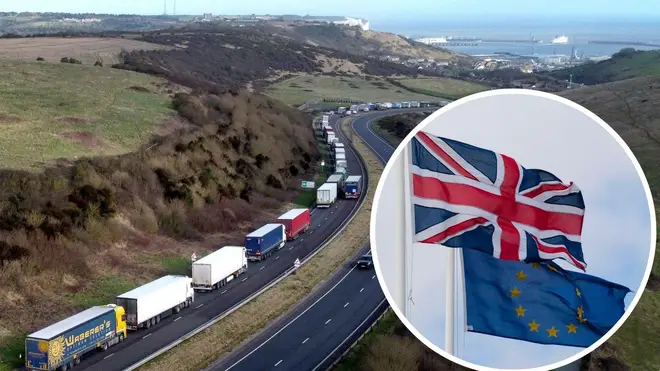
Ian Payne 4am - 7am
9 February 2022, 05:53

Brexit has forced businesses to endure higher costs, more paperwork and border delays, a fresh report has found.
While it was difficult to determine how much trade had taken a hit since the end of the Brexit transition on the last day of 2020, it was "clear that EU exit has had an impact", a paper by the Public Accounts Committee [PAC] said.
Smuggling and other illicit activities could even arise from delays to the introduction of permanent import controls, because lorries arriving at Dover have to go to Ebbsfleet – 60 miles away – to get goods physically checked, the report found.
That could allow for goods to be offloaded before the checks, the committee said.
It comes as Jacob Rees-Mogg was shuffled into a new role, Minister for Brexit Opportunities and Government Efficiency, within the Cabinet Office.
Read more: Boris's Partygate reshuffle: PM moves ministers to reignite his premiership
Read more: Fury as Sajid Javid admits NHS wait list will rise until 2024, despite £12bn recovery plan
Dame Meg Hillier, who chairs the committee, said: "One of the great promises of Brexit was freeing British businesses to give them the headroom to maximise their productivity and contribution to the economy - even more desperately needed now on the long road to recovery from the pandemic.
"Yet the only detectable impact so far is increased costs, paperwork and border delays.
"The PAC has repeatedly reported on Brexit preparedness and at every step there have been delays to promised deadlines.
"It's time the Government was honest about the problems rather than overpromising."

Ed Miliband defends calls for a windfall tax on energy companies
It said the Government had "much more work" to do to help businesses with administration and costs and its pledge to have the "most effective border in the world" was branded "optimistic, given where things stand today".
The report warned border queues could remain a problem as passenger numbers return to normal later this year and noted arrangements have not been tested at pre-pandemic levels yet.
Government should work out how much more businesses are having to spend because of Brexit and come up with ways to reduce the burdens, the committee argued.
Small firms should also get more support, the PAC said, noting that just £6.7m was paid from a help package designed for such businesses was used, out of an available £20m. It suggested narrow criteria had contributed to the limited uptake.
"There is much more work that Government should be doing in the short term to understand and minimise the current burden on those trading with the EU, to address the immediate delivery and readiness risks in introducing import controls, and to have a border in place which is operating effectively without further delays or temporary measures," said Dame Meg.